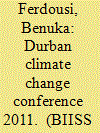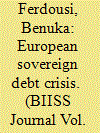|
|
|
Sort Order |
|
|
|
Items / Page
|
|
|
|
|
|
|
| Srl | Item |
| 1 |
ID:
161959


|
|
|
| 2 |
ID:
117743


|
|
|
|
|
| Publication |
2012.
|
| Summary/Abstract |
Climate change can be termed as the greatest challenge of the 21st century as the very existence of human civilisation on the planet Earth is at stake. It is, therefore, imperative to assess the United Nations (UN) Climate Change Conferences in order to see how far the world leaders have progressed to work out a climate regime capable of avoiding irreversible and catastrophic change in climate. This paper aims to make an assessment of the latest UN Climate Change Conference which was held in 2011 in Durban, South Africa. Besides presenting the outcome of the conference, the paper attempts to underline the factors that led to this outcome and analyses the role of different countries in this regard. The paper argues that climate change is not merely an issue of natural science; rather it is very closely linked to global economic and political structures. Hence, what is happening in UN climate negotiations is a reflection of global politics.
|
|
|
|
|
|
|
|
|
|
|
|
|
|
|
|
| 3 |
ID:
118186


|
|
|
| 4 |
ID:
108880


|
|
|
|
|
| Publication |
2011.
|
| Summary/Abstract |
The Global Financial Crisis 2007-08, originated from the sub-prime mortgage crisis in the US, dipped the world economy to a level worst since World War II. Both the developed and developing economies were hit by the crisis although in varying magnitudes. The present article makes an attempt to compare impact of the crisis on the US and China. It shows that China was less affected by the crisis although structural flaws have made both countries exposed to such crisis. It concludes that although the crisis will diminish the power of the US, it will neither replace the US with China as the next super-power nor lead to a bi-polar world led by the US and China; rather it will lead to a fragmented, multi-polar world.
|
|
|
|
|
|
|
|
|
|
|
|
|
|
|
|
| 5 |
ID:
111763


|
|
|
| 6 |
ID:
169579


|
|
|
|
|
| Summary/Abstract |
The Gulf Cooperation Council (GCC) region is home to about three fourth of Bangladesh’s expatriates. In 2018, labour migration from Bangladesh to the GCC countries fell by about 60 per cent. Although fluctuation is common in overseas employment, this fall in labour migration to the GCC appeared as a concern because it took place at a time when the Gulf countries had started a renewed drive for localization of jobs. In this context, this paper attempts to see the implications of recent drive on localization of jobs by the GCC countries on overseas employment of Bangladesh. The paper argues that although the earlier localization efforts in the GCC region achieved little success and the success of recent localization drive is still uncertain, there is not much room for complacency for labour sending countries either. Growing youth unemployment and uncertain future of oil are mounting pressure on the governments of the GCC countries and hence things might not go as before. It, therefore, seems that although the labour countries like Bangladesh may not worry just now, they should get themselves prepared for change in the GCC labour market in long run, if not in short run.
|
|
|
|
|
|
|
|
|
|
|
|
|
|
|
|
| 7 |
ID:
162484


|
|
|
|
|
| Summary/Abstract |
Following the global trend, Bangladesh has declared to meet 10 per cent of its total electricity demand from renewable energy sources by 2021. The article aims to make an assessment of Bangladesh’s achievement in renewable energy and identify its untapped potential along with the challenges. In the process, the article also endeavours to assess the existing plans and policies of the country regarding renewable energy. To date, Bangladesh has been able to generate 556MW of electricity from renewables against the target of 2000MW. The article argues that just comparing the target and achievement figures without considering the context may not be a right approach. It argues that considering the context, performance, potentials and challenges of Bangladesh’s renewable energy sector, the progress is not discouraging at all. The article shows that the country has started the process of resource mapping which is opening new windows for Bangladesh’s renewable energy sector. From the findings of these resource mapping and feasibility studies it seems that Bangladesh has good potential in renewable energy. Finally, the article suggests revising the country’s existing plans and policies regarding renewable energy and investing more in resource mapping and feasibility studies.
|
|
|
|
|
|
|
|
|
|
|
|
|
|
|
|
| 8 |
ID:
154783


|
|
|
|
|
| Summary/Abstract |
Brexit is a significant development in global economy and politics which, in near future, is going to shape the politics and economic policies in the United Kingdom (UK), Europe and beyond. As such, Brexit has raised significant discussion in the academia and policy level all over the world. As a part of this discussion, this paper aims to advance the discussion through identifying the factors which led the UK people towards Brexit. It reveals that European Union (EU) membership is an over-all benefit for the UK, particularly in cases of trade, investment and negotiating power and before the referendum most of the estimates, if not all, depicted a gloomy picture of the UK economy after Brexit. Yet, majority of the UK people voted for Brexit because they had been suffering from some ‘real’ problems for a long time - lower wage, tight housing market and overcrowded schools and hospitals, for which they wrongly held the EU and the immigrants liable, being influenced by their politicians as well as by their long-standing anti-EU sentiment. The paper reveals that ‘real’ causes of the sufferings of the UK people lie in the two basic features of the structure of the UK economy: growing financialisation and neoliberal path of development. Therefore, it can be said that financialisation and neoliberalism were the ultimate factors which, being strengthened by other political factors, led the country towards Brexit.
|
|
|
|
|
|
|
|
|
|
|
|
|
|
|
|
|
|
|
|
|